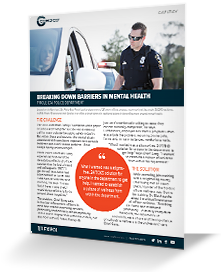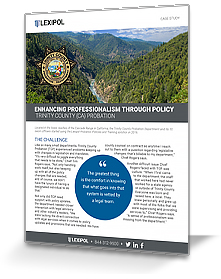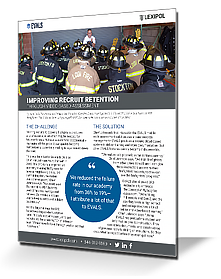The Challenge
The Orange County Fire Authority (OCFA) serves 23 cities and all unincorporated areas of Orange County. Ranging from the Santa Ana Mountains in the east to the Pacific Ocean in the west, the county borders Los Angeles and San Diego counties. OCFA administers 77 stations, protecting a population of nearly 2 million.
Like other progressive municipal agencies, OCFA sees staff mental health as a pressing and urgent challenge to be met. “Mental health is, I believe, as serious an issue confronting the fire service as any out there,” says Chief Brian Fennessy. “It’s right up there with cancer as the top challenge we face. And COVID-19 added to what is already a job that can be stressful and traumatic. We’ve been fortunate enough as a department to not have to take fire companies out of service, as some of our neighbors have, but it’s come close.”
Most of the mental and behavioral health challenges for firefighters, Chief Fennessy says, don’t happen on the fireground. “We can put fires out,” he says. “The struggle happens at the personal and interpersonal level. Beyond that, today’s firefighters are doing so much more than what they’ve ever been asked to do before. I know someone who recently quit the fire service because most of what he was doing was working homeless encampments. It just wasn’t what he had envisioned the job to be, and so, to his credit, he tapped out.”
OCFA’s mission begins, “We proudly serve the changing needs of our communities.” As those changing needs placed new pressures on OCFA members, it became clear the agency needed to do something more to support firefighter physical, mental and emotional wellbeing.
The Solution
A leader among public safety agencies, OCFA has a dynamic and well-resourced wellness program. “We have a chaplain program with a dozen or so chaplains, as well as a peer support team and other support groups,” Chief Fennessy says. “We also offer everyone here outlets for yoga and meditation. We offer trauma-informed counseling and therapy, not just to our employees but to our retirees and families as well.” In these efforts, Chief Fennessy has taken cues from law enforcement initiatives: “They are way ahead of fire when it comes to taking care of mental health. We’re looking to law enforcement to see what’s working and modeling after that.”
This focus led OCFA to discover Lexipol’s Cordico wellness solution, which features an app built specifically for first responders. The app delivers anonymous self-assessments, guidance on more than 60 wellness topics, and one-touch calling to peer support, chaplains and therapists. Agencies that subscribe to the Cordico wellness solution can also provide the app free to department retirees and family members. Although the first Cordico customers were law enforcement agencies, Lexipol now offers a fire service-specific version.
Cordico proved to be just what OCFA needed to pull together their robust wellness services into one intuitive, immediately accessible resource, while supplementing the agency’s offerings with anonymous services developed by clinical psychologists with experience treating firefighters. “What I love about the app is that it’s Dr. Seuss-simple,” Chief Fennessy says. “If you need help, you want to be able to access resources with little effort. You don’t want to have to remember a user name or password. Simplicity is key. The help has to be there, where you need it, when you need it, and that’s what this app provides.”
The Results
A lifelong firefighter, Chief Fennessy knows the challenges, and rewards, of this work. “Stress and trauma don’t just affect the firefighter, but also spill over to the family and community. COVID has made that undeniable,” he says. “Firefighters need to show up physically and mentally strong to do their work. That’s been hard with all of the pandemic-related staffing challenges. But what we’re seeing with our wellness initiatives—and especially with Cordico—is that it’s helping. “It might take a little convincing to get employees to use the app, but once they do, they quickly see the benefit; and their family sees the benefit. Then, due to word of mouth and from other employee experiences, the app gets used and shared more and more. We are seeing the younger generation more readily access the app—it seems like there’s just much less stigma and much more use among the new generation of firefighters.”
Anonymized reports of Cordico app usage, including how much the app gets used by the department and for what reasons, back up Chief Fennessy’s observations. Evidence of success also comes in the form of anecdotes: “I hear the stories about suicides that didn’t happen and marriages saved, so I know it’s working.”
“When I was a firefighter, the feeling was, if you can’t take the traumatic calls, then you’re mentally weak and this job isn’t for you,” Chief Fennessy says. “That’s no longer the case. And with the program we have in place, if something ever comes up for any of our members—even in retirement—they’ll have immediate access to resources and somewhere to turn.”
Just as mental health impacts physical wellbeing, individual wellness radiates outward, improving agency morale and public service. For OCFA, the highest standard of service has required a look inward.




